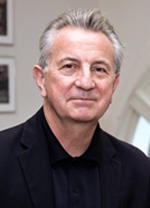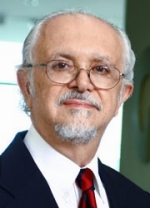Newsroom Archive
John Jay College of Criminal Justice will grant two honorary degrees at graduation ceremonies on May 28, 2014, at the Jacob Javits Center North. This year's honorary degree recipients are renowned for their contributions to academia, advocacy and the betterment of humankind.
CHARLES R. FIGLEY, DOCTOR OF LETTERS
10:30 AM CEREMONY
 Dr. Charles Figley is a psychologist, family therapist and pioneer in the fields of post-traumatic stress and traumatology. He holds the Paul Henry Kurzweg, M.D., Distinguished Chair in Disaster Mental Health and is School of Social Work Professor at Tulane University. His experience as a Vietnam War veteran and antiwar advocate set the stage for what would become a long and distinguished career dedicated to alleviating human suffering.
Dr. Charles Figley is a psychologist, family therapist and pioneer in the fields of post-traumatic stress and traumatology. He holds the Paul Henry Kurzweg, M.D., Distinguished Chair in Disaster Mental Health and is School of Social Work Professor at Tulane University. His experience as a Vietnam War veteran and antiwar advocate set the stage for what would become a long and distinguished career dedicated to alleviating human suffering.
Dr. Figley was attending a massive 1971 antiwar rally in Washington, D.C., where he heard a succession of veterans speak of their fears, rages, nightmares, substance abuse problems and difficulties with a variety of life issues. This led him to graduate and post-graduate study in the field of psychology so that he could better understand, and help, his fellow veterans. He went on to found the Consortium on Veteran Studies, and to develop the diagnosis of Post-Traumatic Stress Disorder.
The holder of a doctorate from Pennsylvania State University, in the interdisciplinary field of human development, Dr. Figley has applied his visionary scholarship to such specialized areas as combat stress, natural disasters, shootings and terrorist incidents, and much more. Following the 1995 bombing of the federal building in Oklahoma City, Dr. Figley founded the Green Cross project, an international humanitarian organization that has provided consultation, training, counseling and other emergency traumatology service in response to the September 11, 2001, terrorist attack on the World Trade Center, the December 2004 tsunami in Sri Lanka and the Virginia Tech massacre in 2007. He also provided extensive consultation to officials in Colorado in response to the 1999 Columbine High School shootings.
Dr. Figley is also co-founder, along with his wife, Dr. Kathy Regan Figley, of the Figley Institute, which seeks to alleviate human suffering resulting from traumatic life experiences by providing professionals and lay people with cutting-edge traumatology training.
He is Director of the Tulane University Traumatology Institute, which he founded while at Florida State University. He was founding editor of Traumatology, the leading independent, peer-reviewed, scientific/medical journal in its field. He was founding editor of the Journal of Traumatic Stress, and is editor of the Routledge Psychosocial Stress Book Series. His scholarly output includes 25 books and 138 refereed journal articles. Among many professional honors, he has received the Pioneer Award from the International Society for Traumatic Stress Studies, which recognizes traumatologists for lifetime achievement that has significantly advanced the field, and the highest honor by the American Psychological Association in trauma psychology, the Award for Lifetime Achievement in the Field of Trauma Psychology. He received the APA’s 1997 Family Psychologist of the Year award, and was a co-recipient, along with his wife, of the Distinguished Service to Families Award from the National Council on Family Relations for their post-9/11 response work.
For his work as a pioneering traumatologist, which speaks directly to the values and vision of this institution, and for his tireless commitment to alleviating human suffering, John Jay College of Criminal Justice confers upon Charles R. Figley the degree of doctor of letters, honoris causa.
MARIO JOSE MOLINA-PASQUEL HENRIQUEZ, DOCTOR OF SCIENCES
3:30 PM CEREMONY
 Dr. Mario Jose Molina shared the Nobel Prize in Chemistry in 1995 for his work linking the environmental release of chlorofluorocarbons to the destruction of the atmosphere’s ozone layer. Due in large part to Dr. Molina’s groundbreaking discoveries, the United States enacted a ban on aerosol-based CFCs in 1978 and led the effort to adopt a global ban on all CFCs in 1985.
Dr. Mario Jose Molina shared the Nobel Prize in Chemistry in 1995 for his work linking the environmental release of chlorofluorocarbons to the destruction of the atmosphere’s ozone layer. Due in large part to Dr. Molina’s groundbreaking discoveries, the United States enacted a ban on aerosol-based CFCs in 1978 and led the effort to adopt a global ban on all CFCs in 1985.
As Distinguished Professor of Chemistry and Biochemistry at the University of California-San Diego, Dr. Molina oversees a research group concerned with laboratory studies of atmospheric chemical processes, as well as science-policy issues related to urban and regional air pollution and to global change. He has built a long and distinguished career based on his deep commitment to the environment and the problems – often human-based – that threaten it. Since winning the Nobel Prize 19 years ago, he has brought the full weight and prestige of the Nobel to his mission of cleaner and safer air.
As a boy, he pursued a fascination with science in a laboratory he created in a converted bathroom, stocked with toy microscopes and chemistry sets. As a young man, Dr. Molina earned his PhD in Chemistry at the University of California-Berkeley, and then moved on to UC-Irvine for a postdoctoral fellowship. It was there that he began the course of scholarship that would lead, ultimately, to the Nobel Prize and his assured place among the ranks of the leading scientists of his day. His work at Irvine is also a testimony to the enduring power of mentoring. Working under Professor F. Sherwood Rowland, he helped to develop the CFC ozone depletion theory, a breakthrough of such consequence that they made a conscious effort to announce their findings outside the normal scientific community, informing policy makers and the news media of their work. Rowland was a co-winner of the Nobel Prize along with Dr. Molina.
Since then, Dr. Molina has himself trained scores of graduate and postgraduate students in environmental chemistry. Moreover, Dr. Molina donated most of the money from his share of the Nobel Prize to scientists and science educators working in developing countries. He also created the Mario Molina Center for Strategic Studies in Energy and the Environment, located in Mexico City, where important, cutting-edge research is conducted into complex environmental problems facing major cities, particularly in the developing world.
In addition to the Nobel Prize, Dr. Molina has received numerous honors and awards for his work. He is a Fellow of the American Association for the Advancement of Science, and a member of the National Academy of Science. He has also been honored by the American Chemical Society, the National Aeronautics and Space Administration and the United Nations, and in 2013 was named as a recipient of the Presidential Medal of Freedom by President Barack Obama.
Dr. Molina’s his tireless commitment to sound environmental policy worldwide and his work as a research scientist and educator epitomizes the values and vision of John Jay.
 Inside JJC (Faculty & Staff)
Inside JJC (Faculty & Staff) Technology Services Status
Technology Services Status

